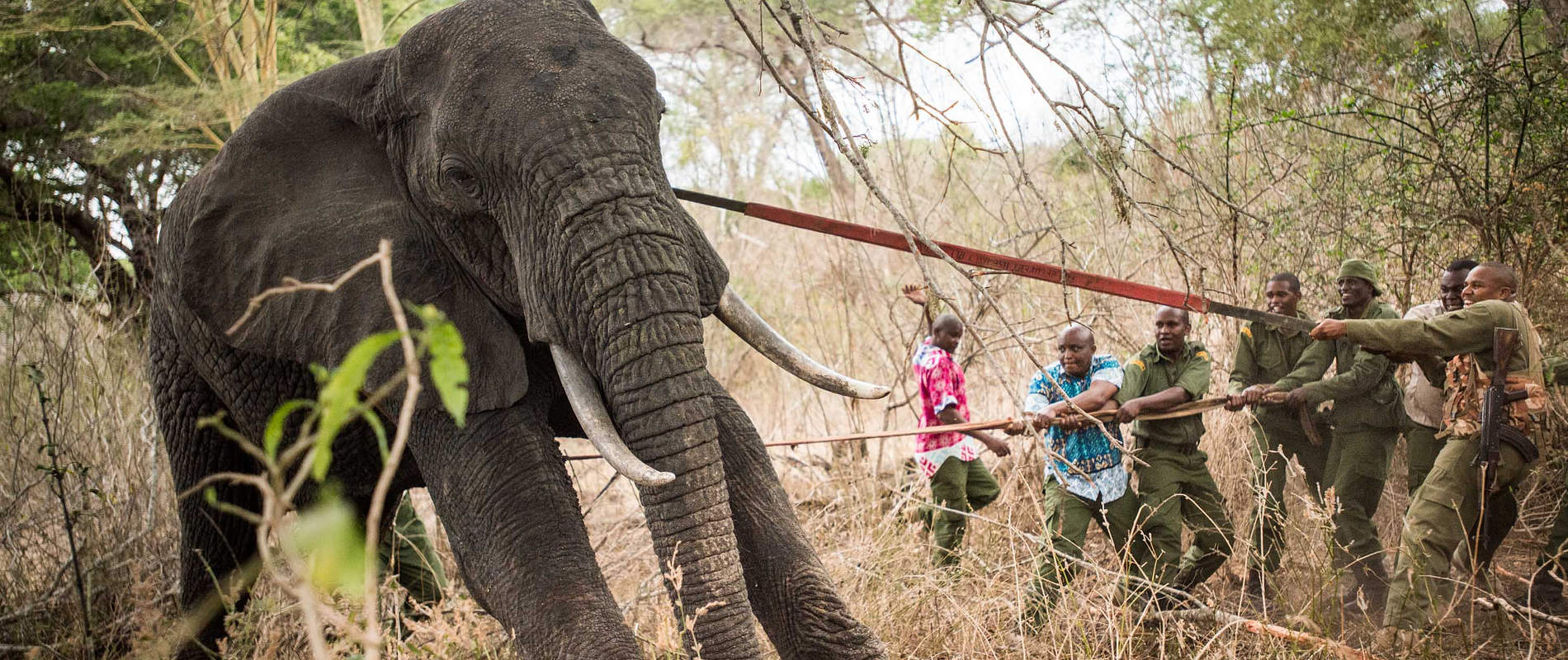Umani Springs Eco Lodge has a front-row view of the Kibwezi Forest’s wildlife. On any given day, crocodiles sun themselves in the pools, bushbuck tuck into the lush grass, and monkeys clamber through the trees. The afternoon of 26th October 2020, however, was different. Around lunchtime, a young adult bull elephant emerged from the fringes of the forest, stopping to drink at the water hole frequented by our Umani Springs orphan herd. It was immediately evident that something was wrong: He was heavily favouring his front right leg and walking with a pronounced limp.


The bull was darted from the air and then the helicopter hovered above to prevent him from retreating into the forest
Angela, who was at Umani Springs at the time, immediately mobilised a treatment. Over at our Kaluku Field HQ, our Cessna 185 and helicopter took to the skies, the airplane heading down to Voi to collect KWS veterinarian Dr. Poghon and his assistants, while the chopper went directly to the Kibwezi Forest airstrip to meet them. While the teams got into place, our SWT/KWS Kenze Anti-Poaching Unit quietly spread out on the ground to keep eyes on the patient. If we lost him in the depths of the Kibwezi Forest, it would be extremely difficult to dart him from the air.

When the bull looked like he was about to fall to the ground from the effects of the anaesthetic the team rushed in

He seemingly fell asleep on his feet which further complicated matters
Thankfully, the bull remained in place, standing placidly beside the water hole. When he heard the helicopter approaching, he immediately moved towards the tree line. In a very skilled bit of flying, our pilot Andy Payne manoeuvered in and out of the forest, hovering just above the treetops so that Dr. Poghon could get a clear shot for the anaesthetic dart. The bull didn’t succumb to it right away, but continued through the trees for about 15 minutes after being darted. The helicopter remained just above him, ensuring he didn’t move deeper into the forest.

After much pulling, shoving and tugging at him he finally unlocked his legs and slumped to the ground

A vehicle was brought in to assist, but just at that moment he fell to the ground sound asleep
As the ground team moved in, they discovered that the patient had fallen asleep in a semi-standing position — and he was in no rush to lie down! This happens occasionally, which is why the team always comes prepared with specialised elephant straps. Securing them around his middle, it took all hands on deck — the veterinary team, anti-poaching rangers, drivers, and even eco lodge staff — pulling with all their might to bring the bull down.

The team got to work pouring water behind his ears and keeping his airways open

The injury was to the front right ankle joint
From there, the team got to work. One man poured water behind the bull’s ears to keep him cool, while another put a small stick in the opening of his trunk to keep his airways open. When an animal’s immune system is compromised, parasitic insects often take up residence. This fellow was covered in ticks, so we sprayed him with a hearty dose of Frontline to keep them at bay.

It was a nasty injury; a torn ligament most probably caused by falling into a hole and twisting his leg

Injections to the joint were administered, including anti-inflammatories and a broad spectrum antibiotic
Identifying no external injuries, Dr. Poghon discovered that the patient was suffering from torn ligaments in his front right leg. These unfortunate accidents happen sometimes, the painful result of taking a wrong step into a hole or tripping over a root. Only time can heal ligament damage, but we helped the process along by administering long-acting antibiotics and anti-inflammatories. After Dr. Poghon injected the anaesthetic reversal, everyone cleared the area so the bull could rise to his feet in peace.


We often marvel at elephant intuition. Time and again, injured wild elephants have shown up around our Reintegration Units, as if asking for help. The fact that this bull appeared at a well-known haunt of our orphans, and remained there for several hours, indicates he was doing just that. Our team based at Umani Springs will continue to keep an eye on him in the coming weeks, in the event that he needs follow-up treatment — which, given his injury, might well be the case. Joint injuries are problematic, but initial indications leave us optimistic: After waking, he lumbered off into the forest and immediately climbed a small hill without too much difficulty, which is a promising sign for this handsome young bull. He is in a safe and gentle environment, with plenty of food and water at hand, and hopefully he will remain within the forest to heal.

